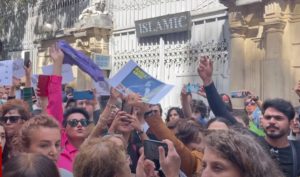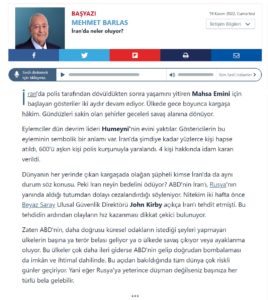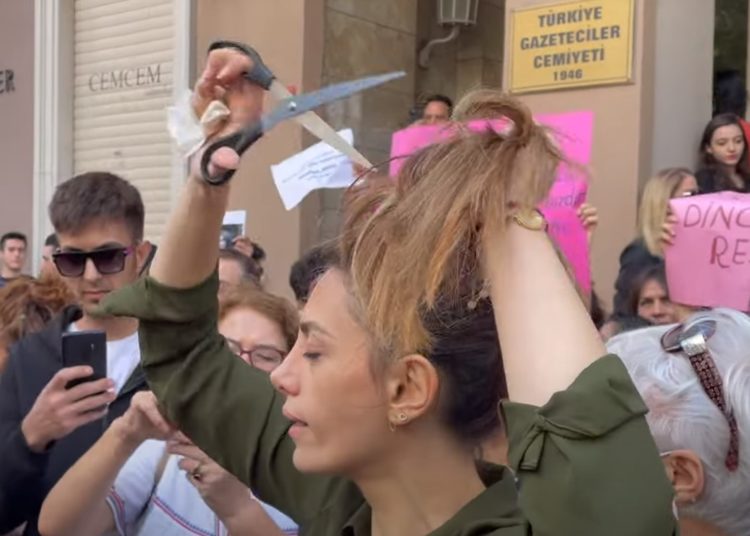Abdullah Bozkurt/Stockholm
Turkey’s pro-Iranian ruling Justice and Development Party (AKP) government has sided with the mullah regime in Iran amid months-long protests sparked over the murder of 22-year-old Mahsa Amini by Iran’s morality police.
“We attach great importance to the restoration of stability and social peace in Iran as soon as possible and hope to see calm quickly restored,” said Turkish Foreign Minister Mevlüt Çavuşoğlu in a letter to parliament on December 12, 2022.
The letter did not call for restraint by the Iranian authorities in the crackdown nor did it include a single criticism of Iran’s handling of Amini’s case.
Çavuşoğlu simply noted that Turkey was saddened by the loss of life in the incidents.
Túrkish Foreign Minister Mevlüt Çavuşoğlu’s letter on the protests in Iran:
Turkey’s top diplomat’s letter came in response to a question by opposition lawmaker Hişyar Özsoy, who asked the government about the policy on Iran with regard to Amini’s murder after her torture on September 13, 2022 and whether any diplomatic initiative in that respect had been taken with Iran since then.
The foreign minister did not even mention Amini’s name in his letter and completely ignored the case.
Çavuşoğlu’s comments are the first-ever official remarks issued by any government official in Turkey since the demonstrations launched in Iran after the murder. The government of President Recep Tayyip Erdoğan remained silent on the protests, and the Ministry of Foreign Affairs has not issued any statement on Iran since September.
In the meantime, the media under government control spouted anti-Western and anti-Israeli conspiracies that foreign powers were behind the protests, parroting the mullah regime’s official narrative. Mehmet Barlas, chief columnist at the Sabah newspaper, owned by President Erdoğan’s family, accused the US and global powers of being behind the protests in Iran.

In an op-ed piece titled “What is happening in Iran,” Barlas wrote on November 19, 2022 that “the fact is that countries that do not do what the US, or rather the global powers, wants face either the scourge of terrorism or a war or an uprising.” He recalled a warning issued to Iran two weeks earlier by John Kirby, the White House national security council coordinator for strategic communications, as proof and claimed the incidents in Iran had gained momentum in Iran after Kirby’s statement.
According to Barlas, the US is the usual suspect in protests in Iran, similar to Washington’s involvement in triggering all the chaotic events around the world.
The government-controlled media in Turkey is effectively peddling the talking points of the Iranian leadership on the protests. On October 3, 2022 Iran’s leader, Ayatollah Ali Khamenei, accused the US and Israel of planning the protests.
He said he was “heartbroken” by the death of Amini in custody and called her death a “sad incident.” However, he described the protests as a foreign plot to destabilize Iran. “This rioting was planned,” he claimed, putting the blame on the US and Israel and their proxies in the region.

The Erdoğan government’s position is hardly surprising given the fact that many senior positions in the state are staffed by pro-Iran Islamists who were nurtured as sympathizers of the 1979 Iranian revolution during their youth.
Similarly, in 2009, Turkey sided with the Iranian regime in its violent suppression of the demand for more democracy during and after a rigged a presidential election. In the 2008 protests, Erdoğan also underlined the importance of stability in his call to his Iranian counterpart, Hassan Rouhani, and avoided criticizing Iran for a deadly crackdown on protests that erupted over corruption, mismanagement and high prices.
Protests in Turkey over Amini’s death and in support of the demonstrations in Iran also faced a crackdown by the Turkish police at the order of the government. On September 20, police prevented a protest by Iranian women in Istanbul’s historic Taksim Square, seized their placards and banners and detained three women for defying the ban.
Two days later, another protest planned in Istanbul’s Kadıköy district was cancelled at the last minute, with police starting to inspect the passports of Iranian women as part of an intimidation tactic to scare them off from holding the demonstration.
The Istanbul’s Governor’s Office allowed only one demonstration in front of the Iranian Consulate in the city, on September 21, before banning all others planned at the same location. The area around the consulate was cordoned off by the police to prevent protestors from approaching and gathering around the building in the Fatih district.
The Turkish president’s secret engagement with Iran was revealed during graft probes in 2013 that showed how Erdoğan and his associates took a huge amount of bribes from an Iranian operative named Reza Zarrab, who laundered Iranian government funds using the Turkish state-owned Halkbank in order to avoid US sanctions. The Quds Force probe, investigated between 2011 and 2014, also exposed a number of close associates of the Turkish president as being involved with Iranian operatives and assets in Turkey. The US authorities have either indicted or designated a number of Erdoğan’s associates for violating US laws on Iran sanctions.












